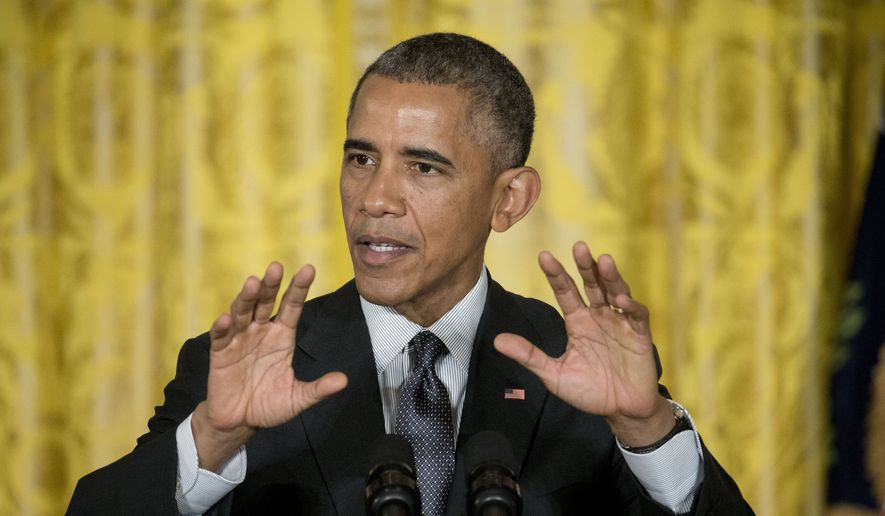The Obama administration aims to ramp up the federal government’s cybersecurity arsenal, requesting nearly $14 billion in its 2016 budget proposal — about $1 billion more than in previous budgets — to combat what many have come to view as an increasingly significant weakness in American security and infrastructure.
The increased funding comes after a series of high profile attacks, which has drawn national attention to the issue, including a massive breach at Sony Pictures which the government said was carried out by North Korea.
Likewise in January, the Twitter and YouTube accounts for the U.S. military’s CENTCOM — which oversees operations in Iraq and Afghanistan — was hacked by supporters of the Islamic State, a terrorist group often known by the acronyms ISIS or ISIL.
“Cyber threats targeting the private sector, critical infrastructure and the federal government demonstrate that no sector, network or system is immune to infiltration by those seeking to steal commercial or government secrets,” the White House said in a statement.
Though the president’s budget proposal was met with widespread criticism by GOP lawmakers on Capitol Hill Monday, cybersecurity is likely going to be one area where both parties find common ground.
Much of the requested money will be split across major government agencies that focus on cybersecurity, including the Departments of Homeland Security, Justice and Defense.
SEE ALSO: Obama says he won’t accept budget that doesn’t raise spending
DHS will first look to improve the federal government’s own cybersecurity assets, requesting nearly $480 million for programs that stop malicious attacks against government computers, and another $100 million for hardware, software and support services that provide continual support of federal networks.
The agency noted cybersecurity is “of growing relevance to our national and economic security.”
DHS’ lead cybersecurity office, the National Protection and Programs Directorate, said it responded to nearly 56,000 cyber incidents last year involving either the federal government or critical infrastructure.
Likewise, the Justice Department wants more resources to target cybercriminals, requesting an additional $27 million to spend on cyber investigations and prosecutions. The agency’s current cybersecurity spending is estimated to be about $500 million.
“Cyber resources will expand digital forensic expertise, provide training on cybercrime and digital evidence for all criminal prosecutors and bolster cybercrime prosecutorial efforts nationwide,” the agency said in a press statement.
The extra $27 million the Justice Department is requesting, will be dedicated to hiring 60 new people — including 30 new U.S. attorneys — to focus solely on cybercrime, including gathering evidence and pressing charges. The Justice Department’s Criminal Division is also requesting $6 million to hire 54 new employees to help improve digital forensics for investigations, develop cyber policy and improve information sharing with both private sector and foreign partners.
SEE ALSO: Obama budget calls for largest federal civilian workforce since Cold War
Meanwhile, the FBI is asking for an additional $10 million to improve “cyber collection and analysis” and to ensure it has the capabilities it needs to investigate crimes that involve the Internet and cyberspace. That would join the FBI’s current cyber budget of about $470 million.
In her confirmation hearing to be the next U.S. attorney general last week, Loretta Lynch noted that many of the Justice Department’s most important efforts increasingly involve cyber aspects, including stopping terrorism, child pornography and human trafficking.
“If confirmed, I intend to expand and enhance our capabilities in order to effectively prevent ever-evolving attacks in cyberspace, expose wrongdoers, and bring perpetrators to justice,” Ms. Lynch said.
The president’s cyber budget proposals would help “institutionalize modern digital delivery practices and establish more effective partnerships both within government and with the private sector,” the White House said Monday.
The proposal also focuses on attempting to improve cooperation and coordination between various agencies responsible for cybersecurity, something critics say has been drastically lacking in American cyber efforts.
In December, the General Services Administration got the go-ahead to spend $35 million on a ’cyber campus’ that would “house federal employees and contractors dedicated to the civilian cyber security mission,” the agency’s budget proposal said. Officials have indicated the campus would be built somewhere inside of — or close to — the Beltway, but have not specified a location yet.
Once completed, it would collect many of the nation’s non-military cybersecurity offices into one place, including the capabilities of the Homeland Security Agency and FBI, as well as potentially the National Security Agency.
Although Pentagon officials said its CENTCOM hack last month had no effect on military operations, it presented a large public relations and optics problem for the armed forces as one of the top terrorist organizations in the world was able to take over their social media accounts.
In a number of recent speeches — including his State of the Union address — President Obama called upon Congress to pass comprehensive cybersecurity legislation that would help shore up the nation’s defenses and allow greater communication and information sharing about cyberattacks between the public and private sectors.
“Even as we get better, the hackers are going to get better too,” the president said in a December speech. “Some of them are going to be state actors; some of them are going to be non-state actors. All of them are going to be sophisticated and many of them can do some damage.”
• Phillip Swarts can be reached at pswarts@washingtontimes.com.




Please read our comment policy before commenting.